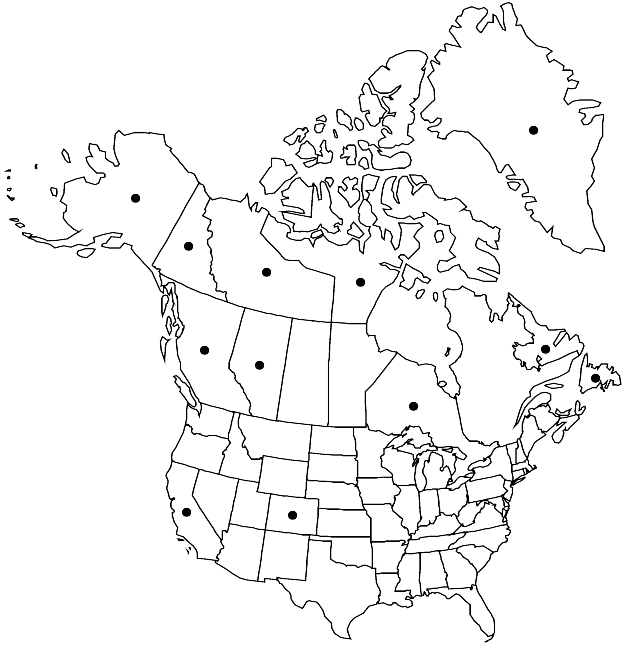Difference between revisions of "Ptychostomum neodamense"
Phytologia 87: 21. 2005.
FNA>Volume Importer |
FNA>Volume Importer |
(No difference)
| |
Revision as of 19:45, 24 September 2019
Plants in dense or open turfs, green, red-green, or yellow-green. Stems 2–4(–6) cm, tufted, comose, innovations elongate and evenly foliate; often strongly radiculose. Leaves yellow-green to green, proximal leaves distinctly black-gray with age, crowded, strongly twisted to contorted when dry, ovate, strongly concave, (1–)2–3(–4) mm, not much enlarged toward stem apex; base wide, not or weakly decurrent; margins revolute to mid leaf or beyond, limbidium strong, in 2 or 3 rows; apex broadly acute to obtuse; costa not reaching apex to percurrent, rarely short-excurrent, awn smooth; proximal laminal cells 3–4:1, same width or wider than more distal cells; medial and distal cells rhomboidal, 14–20 µm wide, 2–3:1, walls usually firm to incrassate. Specialized asexual reproduction absent. Sexual condition dioicous. Seta 1–3(–4) cm. Capsule brown, elongate-ovate, symmetric, 3–5 mm, mouth yellow; operculum conic, apiculate; peristome well developed; exostome teeth yellow basally, hyaline distally, lamellae usually straight mid tooth, pores absent along mid line; endostome not adherent to exostome, basal membrane high, 1/2 exostome height, segments with ovate perforations, cilia long, appendiculate. Spores (10–)12–16 µm, finely papillose, pale yellow or green.
Phenology: Capsules mature Jul–Aug.
Habitat: Wet soil, soil over rock, often calcareous
Elevation: low to high elevations (0-3000 m)
Distribution

Greenland, Alta., B.C., Nfld. and Labr., N.W.T., Nunavut, Ont., Yukon, Alaska, Calif., Colo., Eurasia.
Discussion
Ptychostomum neodamense is closely related to P. bimum, P. subneodamense, and P. pseudotriquetrum, differing in its ovate, blunt, mostly non-decurrent leaves crowded along the stem. The costal awns are stout. D. T. Holyoak and L. Hedenäs (2006) did not consider P. neodamense a good species, based on a very limited sampling from Europe, but their results could also be interpreted to suggest that it may be distinct. Disjunct material from California closely matches European collections, but Colorado material differs somewhat in overall habit and ecology.
Selected References
None.